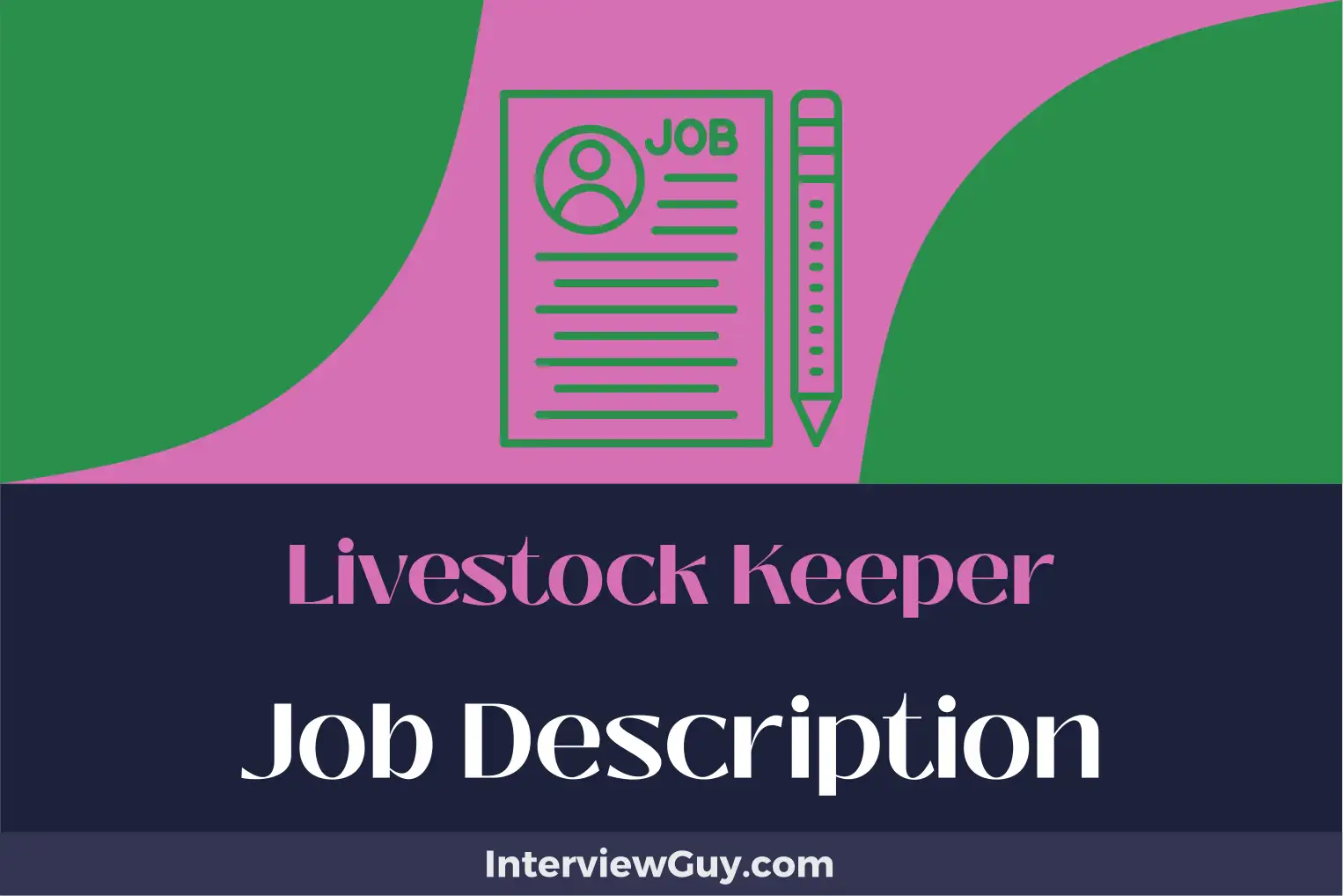Livestock Keeper Job Description [Updated for 2026]

In the age of sustainable farming, the role of livestock keepers has never been more crucial.
As the demand for organic and locally sourced food escalates, so too does the need for competent individuals who can care for, breed, and protect our agricultural livestock.
But let’s delve a little deeper: What’s truly expected from a livestock keeper?
Whether you are:
- A job seeker looking to understand the crux of this role,
- A farm manager planning out the ideal candidate,
- Or simply fascinated by the intricacies of livestock keeping,
You’re in the right place.
Today, we introduce a customizable livestock keeper job description template, designed for easy posting on job boards or agricultural career sites.
Let’s get started.
Livestock Keeper Duties and Responsibilities
Livestock Keepers are responsible for the day-to-day care of a variety of animals, including cows, pigs, goats, and sheep.
They ensure that the animals are healthy, safe, and well-fed.
Livestock Keepers have the following duties and responsibilities:
- Feed and water the livestock daily
- Monitor the health and wellness of the livestock, identifying and reporting any signs of illness or distress
- Provide routine medical treatments such as vaccinations, deworming, and hoof trimming
- Ensure that the living conditions of the livestock are clean and safe, performing tasks such as mucking out stalls, repairing fencing, and checking for hazards
- Assist with the breeding process, including monitoring the animals for signs of heat, assisting with artificial insemination or natural breeding, and caring for pregnant animals and newborns
- Move livestock between different pastures or enclosures to ensure they have access to fresh grass or fodder
- Record information about each animal, such as weight, growth rate, and any health concerns
- Maintain equipment and facilities, such as tractors, feeders, and watering systems
Livestock Keeper Job Description Template
Job Brief
We are seeking a dedicated Livestock Keeper to manage the day-to-day needs of our livestock.
The Livestock Keeper’s responsibilities include feeding animals, cleaning enclosures, monitoring animal health, and maintaining records of care.
Our ideal candidate has experience with animal husbandry and is committed to maintaining the highest standards of animal welfare.
Ultimately, the role of the Livestock Keeper is to ensure the health and well-being of our livestock, contributing to the overall success of our farming operations.
Responsibilities
- Feeding livestock and ensuring they have access to water at all times
- Cleaning and maintaining livestock living areas
- Observing animal behavior and health, and reporting concerns or changes to the farm manager
- Administering medication to sick animals under the direction of a veterinarian
- Assisting with animal births
- Maintaining accurate records of animal care, including feed schedules, medical treatments, and animal behavior
- Adhering to safety and sanitation regulations
- Assisting with other farm duties as needed
Qualifications
- Previous experience in animal husbandry or related field
- Knowledge of animal behavior and care
- Physical strength and stamina for heavy lifting and long hours of work
- Ability to work in all weather conditions
- Basic record-keeping skills
- High school diploma or equivalent
Benefits
- Health insurance
- Dental insurance
- Paid time off
- Retirement plan
Additional Information
- Job Title: Livestock Keeper
- Work Environment: This position requires outdoor work in all weather conditions and physical labor. The candidate must be comfortable working with large and small animals.
- Reporting Structure: Reports to the Farm Manager.
- Salary: Salary is based upon candidate experience and qualifications, as well as market and business considerations.
- Pay Range: $25,000 minimum to $45,000 maximum
- Location: [City, State] (specify the location or indicate if remote)
- Employment Type: Full-time
- Equal Opportunity Statement: We are an equal opportunity employer and value diversity at our company. We do not discriminate on the basis of race, religion, color, national origin, gender, sexual orientation, age, marital status, veteran status, or disability status.
- Application Instructions: Please submit your resume and a cover letter outlining your qualifications and experience to [email address or application portal].
What Does a Livestock Keeper Do?
Livestock Keepers, also known as Animal Husbandry Professionals or Ranchers, are primarily responsible for raising, caring for, and managing animals that are used for food production, fibers, plants, and other farm products.
They feed, water, and monitor the health of the livestock, which can include a variety of animals like cows, pigs, sheep, goats, and poultry.
They might also be responsible for breeding animals to maintain population sizes and improve the quality of future generations.
Livestock Keepers ensure the animals’ living conditions are clean and up to set standards.
This includes cleaning enclosures, barns, and pens and ensuring that all animals have adequate shelter.
They may also help with the birthing process, provide basic veterinary care, and administer medications or vaccinations as required.
In addition, Livestock Keepers are often involved in managing the business aspects of the farm, such as marketing the farm’s products, maintaining records, and purchasing necessary supplies and equipment.
The role can be physically demanding, as it involves a lot of manual work and they may have to operate heavy machinery.
Livestock Keepers often work long hours, including on weekends and holidays, especially during planting and harvesting seasons or when animals are giving birth.
Livestock Keeper Qualifications and Skills
A qualified livestock keeper should have the skills and qualifications that align with your job description, such as:
- Experience with animal husbandry practices, including feeding, vaccination, breeding, and birthing procedures
- Able to monitor animal health, identify signs of illness or injury, and administer basic medical treatment
- Physical stamina and strength for manual labor tasks, such as lifting feed bags, cleaning barns, and handling large animals
- Comfortable working in all weather conditions, as care for animals can often be an outdoor job
- Knowledge of animal behavior, to safely and effectively manage livestock
- Attention to detail for record-keeping, such as tracking feed intake, weight, health issues, and breeding cycles
- Problem-solving skills to address issues such as animal health concerns, fencing problems, and feed quality
- Good communication skills for liaising with veterinarians, farm managers, and other agricultural professionals
- Understanding of agricultural regulations and animal welfare standards
Livestock Keeper Experience Requirements
Livestock Keepers are typically required to have a significant amount of practical experience working with animals.
This can be gained through part-time or full-time positions, internships, or volunteer work in farms, zoos, or animal shelters.
Entry-level candidates often have 1 to 2 years of experience in animal care, where they have learned the basics of feeding, handling, and caring for different types of livestock.
Candidates with more than 3 years of experience usually have a deeper understanding of animal health and welfare, including knowledge of disease prevention and treatment, breeding and rearing practices, and the maintenance of appropriate living conditions for different species.
Those with more than 5 years of experience often have management or supervisory experience, where they have overseen the work of other staff, planned and implemented livestock breeding and care programs, and ensured compliance with animal welfare regulations.
Furthermore, livestock keepers with several years of experience and a proven track record may be qualified for more specialized roles such as a livestock manager or a consultant in animal husbandry.
Education in a related field, such as animal science or veterinary technology, can also be beneficial for gaining knowledge and skills relevant to livestock keeping.
Livestock Keeper Education and Training Requirements
Livestock Keepers typically require a high school diploma or equivalent.
However, having an associate’s or bachelor’s degree in animal science, agriculture, or a related field can offer an advantage.
They should possess a foundational understanding of animal health, nutrition, and livestock management principles.
This can be gained through hands-on experience or formal education.
In addition to education, practical experience in handling and caring for livestock is crucial.
This can be obtained through internships, volunteering, or work on a farm or ranch.
Certain roles, especially in larger commercial operations, may also require knowledge of business and farm management, which can be obtained through business administration courses or degrees.
Professional certifications such as the Certified Professional Animal Care Provider (CPACP) credential can also be beneficial for advancement in this field.
Continuing education is also important in this role, as livestock keepers must stay up to date with advancements in animal health care and farming technology.
Livestock Keeper Salary Expectations
A Livestock Keeper earns an average salary of $33,800 (USD) per year.
The earnings may differ based on factors such as experience, location, and the size of the farm or ranch they are employed by.
Livestock Keeper Job Description FAQs
What skills does a Livestock Keeper need?
Livestock Keepers must have physical stamina for manual labor and be comfortable working outdoors in various weather conditions.
They should have a basic understanding of animal behavior and needs, and be skilled in handling and controlling animals.
Attention to detail is crucial for monitoring animal health and detecting early signs of illness or injury.
Knowledge about safe and effective use of farm machinery can also be beneficial.
Do Livestock Keepers need a degree?
A degree is not typically required for a Livestock Keeper, although some may choose to pursue a degree in animal science or a related field.
Training often occurs on the job.
However, for larger operations or specialized livestock care, employers may prefer individuals with formal education or significant experience in animal husbandry.
What should you look for in a Livestock Keeper resume?
In a Livestock Keeper’s resume, look for prior experience in animal care or farm work, which is the most relevant.
Experience with specific types of livestock or machinery could also be beneficial, depending on your operation’s needs.
Additionally, any training or certifications in animal health, safety, or handling can be advantageous.
What qualities make a good Livestock Keeper?
A good Livestock Keeper is dedicated, responsible, and observant, with a genuine interest in animal welfare.
They must be reliable, as livestock require daily care, regardless of weekends or holidays.
They should also have good problem-solving skills to handle unexpected situations, such as health issues or equipment failure, efficiently and effectively.
Is it difficult to hire a Livestock Keeper?
Hiring a Livestock Keeper can be challenging due to the specific skill set and physical demands of the job.
It is important to clearly communicate the job responsibilities and expectations to attract the right candidates.
Offering competitive compensation and benefits, as well as opportunities for learning and growth, can also help in attracting and retaining qualified Livestock Keepers.
Conclusion
And there we have it.
Today, we’ve given you a peek behind the barn door to see what being a livestock keeper truly entails.
Surprise, surprise?
It’s not just about feeding animals.
It’s about nurturing life, one feeding at a time.
Armed with our reliable livestock keeper job description template and real-world examples, you’re ready to step into your boots.
But why not go a step further?
Immerse yourself with our job description generator. It’s your guide to creating meticulous job listings or honing your resume to perfection.
Remember:
Every feeding, every care, contributes to the bigger picture.
Let’s cultivate that future. Together.
How to Become a Livestock Keeper (Complete Guide)
Financial Fantasies Turned Reality: The Highest Paying Jobs Uncovered!
The Calm Career Collection: Jobs That Won’t Rattle Your Nerves
Breaking the Work Mold: Unusual Jobs That Are Refreshingly Different
Shockingly Low-Paying Jobs That Millions Are Working Today – Are You Next?



![Desktop Systems Engineer Job Description [Updated for 2026]](https://interviewguy.com/wp-content/uploads/2024/05/desktop-systems-engineer-job-description-768x512.webp)


![Floral Display Artist Job Description [Updated for 2026]](https://interviewguy.com/wp-content/uploads/2024/07/floral-display-artist-job-description-768x512.webp)